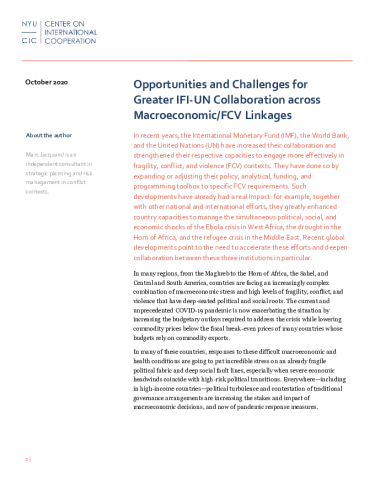In recent years, the International Monetary Fund (IMF), the World Bank, and the United Nations (UN) have increased their collaboration and strengthened their respective capacities to engage more effectively in fragility, conflict, and violence (FCV) contexts. Recent global developments, particularly the COVID-19 pandemic, point to the need to accelerate such efforts and deepen collaboration between these three institutions.

Everywhere—including in high-income countries—political turbulence and contestation of traditional governance arrangements are increasing the stakes and impact of macroeconomic decisions, and now of pandemic response measures. This extremely challenging global landscape, where risks intersect with increasing virulence, is calling out for greater collaboration between the IMF, the Bank, and the UN, as the three institutions to which many countries that find themselves facing such crises often turn. This briefing by Marc Jacquand makes the case for increased collaboration on four levels: factual, financial, political, and counterfactual. It also lays out the challenges, both internal and external, that impede collaboration. Finally, it makes recommendations for institutional improvements to facilitate more effective joint work in FCV contexts.
Download the full briefing here.
Other papers in the UN-IFI policy briefing series:
- Sarah Cliffe, Paige Arthur, Leah Zamore, Strengthening Approaches to Conflict Prevention and Peacebuilding at the UN and IFIs: Key Ideas and Recommendations
- Paige Arthur, A Stocktaking of the UN-IFI Relationship on Prevention and Peacebuilding, 2018 to 2020
- Marc Jacquand, A Summary of UN-IFI Institutional Arrangements in FCV Contexts


